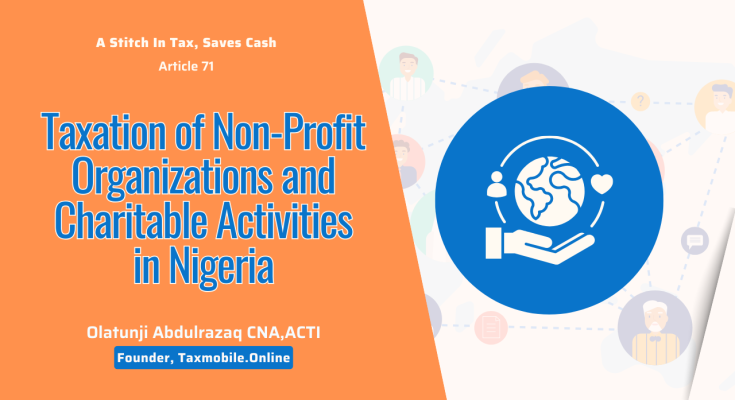Non-Profit Organizations (NPOs) play a pivotal role in societal development, addressing critical needs such as education, healthcare, religion, and social welfare. These entities are structured to achieve objectives that benefit the public rather than generate profits for distribution.
In Nigeria, examples of NPOs include churches, mosques, charitable foundations, non-governmental organizations (NGOs), and community-based organizations.
While Nigerian tax laws recognize the unique nature of NPOs and provide significant exemptions, these organizations are not entirely immune from tax obligations.
The tax treatment of NPOs hinges on the nature of their activities, the sources of their income, and how this income is applied.
This article provides an in-depth exploration of the taxation framework for NPOs in Nigeria, highlighting exemptions, obligations, and best practices for compliance.
Tax Exemptions for Non-Profit Organizations
Under Section 23(1)(c) of the Companies Income Tax Act (CITA), NPOs are exempt from Companies Income Tax (CIT) on income applied solely towards their charitable or non-profit objectives, such as promoting religion, education, or healthcare. However, the exemption applies only if:
1. Income is Exclusively Applied: Income is used exclusively for the purposes for which the NPO was established.
2. No Unrelated Business Activities: Income derived from unrelated commercial activities does not enjoy tax exemptions.
Practical Example:
Exempt Income: Donations received by a charitable foundation for free healthcare are tax-exempt.
Taxable Income: Rental income earned from leasing out office space for commercial purposes is subject to CIT.
Value Added Tax (VAT)
NPOs are not fully exempt from Value Added Tax (VAT). The treatment depends on the nature of transactions:
1. Exempt Transactions: Donations, gifts, and grants received by NPOs are not subject to VAT.
2. Taxable Transactions: Fees for goods or services provided outside the scope of their charitable objectives may attract VAT at the standard rate of 7.5%.
Practical Example:
Exempt Activity: Income on core charitable activities collected by an educational NPO are VAT-exempt.
Taxable Activity: A church operating a bakery for public sales must charge VAT on its goods.
Withholding Tax (WHT)
NPOs must comply with Withholding Tax (WHT) obligations in two ways:
1. Deduct and remit WHT when paying contractors or service providers.
2. Pay WHT on investment income such as rent, interest, and dividends.
Practical Example:
An NGO contracting a logistics company for event transport must deduct and remit WHT at the applicable rate before payment.
Personal Income Tax (PIT) for Employees
Employees of NPOs are subject to Personal Income Tax (PIT) under the Personal Income Tax Act (PITA). NPOs must:
1. Deduct and remit Pay-As-You-Earn (PAYE) tax on employees’ salaries and benefits.
Practical Example:
An orphanage hiring staff for daily operations must remit PAYE taxes to the relevant state tax authority.
Stamp Duties
Stamp duties are levied on legal documents such as contracts, leases, and agreements executed by NPOs, unless specifically exempted by law.
Practical Example:
A charitable organization signing a lease for office space must pay stamp duty on the lease document.
Tax Obligations for Business Activities
If an NPO engages in unrelated business or commercial activities, income from such ventures is taxable under Nigerian law. Examples include:
1. Leasing out properties for commercial purposes.
2. Running businesses unrelated to the NPO’s core charitable objectives.
Practical Example:
A religious organization renting out event halls for non-religious purposes must pay CIT and VAT on the income.
Filing Obligations
Under Section 55 of CITA, NPOs must file annual tax returns with the Federal Inland Revenue Service (FIRS), even if exempt from tax. The filing must include:
1. Audited financial statements.
2. Evidence that income has been used exclusively for charitable purposes.
Failure to file returns may result in penalties, reputational damage, or scrutiny from tax authorities.
Oversight by FIRS
The FIRS actively monitors NPOs to:
1. Prevent abuse of tax exemptions.
2. Ensure compliance with objectives.
3. Detect unrelated business activities.
Tax-exempt status may be revoked if an NPO is found to be engaged in substantial unrelated business activities without reinvesting the proceeds into its charitable objectives.
Tax Incentives for Donations
Section 25 of CITA provides tax incentives to donors contributing to approved NPOs. Eligible donations qualify for tax deductions, encouraging philanthropy.
Practical Example:
A corporation donating to a foundation combating child malnutrition can claim tax deductions for the donation.
Best Practices for Compliance
To maintain compliance and retain tax-exempt status, NPOs should:
1. Segregate Income Sources: Separate income from charitable activities from unrelated business activities.
2. Maintain Detailed Records: Ensure accurate financial records to justify tax exemptions.
3. Seek Professional Advice: Engage tax professionals for compliance and to navigate complex tax regulations.
4. Conduct Regular Audits: Periodic audits help ensure transparency and adherence to tax laws.
Case Studies
1. Church Operating a Logistics Company
- Donations and tithes: Tax-exempt.
- Income from logistics business: Taxable.
2. NGO Leasing Office Space
- Donations for legal aid: Tax-exempt.
- Rental income from leased property: Taxable.
3. Educational Foundation Hosting Paid Seminars
- Tuition fees: Exempt.
- Seminar income unrelated to core activities: Taxable.
4. Charity Running a Consultancy
- Donations for healthcare: Exempt.
- Consultancy income: Taxable.
5. Faith-Based Organization Renting Event Halls
- Religious activities: Exempt.
- Rental income: Taxable and subject to VAT.
Conclusion
While NPOs in Nigeria enjoy substantial tax exemptions, compliance with tax obligations for unrelated business activities is crucial.
Proper record-keeping, adherence to filing requirements, and strict segregation of income streams are essential to retain tax privileges.
NPOs are advised to seek professional guidance to navigate tax complexities and ensure transparency. This approach not only preserves the integrity of the organization but also fosters public trust in its operations.
Olatunji Abdulrazaq CNA, ACTI, ACIArb
Founder/CEO, Taxmobile.Online




